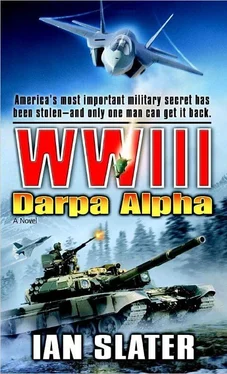“What I don’t understand,” said Abramov, is how American intelligence found its way to us.”
“Luck,” proffered Beria. “Pure, stupid American luck.”
“Whatever it was,” put in Cherkashin, “we should make damn sure we get this Freeman. He’s a cunning bastard. He’s like that Patton. And this’ll be the second time he’s been here. We don’t want to have to deal with him again.”
On this there was unanimous agreement.
“Well,” said Beria, “last I heard, our Arab friends were working with someone in Hamas.” He paused. “Or perhaps it was the Abu Haf’s al-Masri Martyr Brigades. Some youngster who has lived in America, studied there.”
“A bomber, you mean?” said Cherkashin.
“Perhaps,” said Beria.
“I don’t know,” said Cherkashin. “If the Americans see anyone coming near them they’ll shoot first and ask questions later. They’ve learned in Iraq what we learned in Afghanistan. Arabs have used kids as bombers.”
“Do we have such people?” inquired Beria.
“No,” answered Abramov. “But Beria has a point. Last time I was in Palestine, closing the deal for what will be our first batch of the super-cavitating MANPADs, I also came across one of Hamas’s leaders, an Iranian officer with the Abu Haf’s al-Masri Martyr Brigades who had been given the job of mentoring a young boy with jet-black hair and blue eyes. He was about eleven, maybe twelve years old. Orphaned as a baby in the Iraq War. A true little Muslim fanatic who, the officer told me, had been schooled for a time in America — immersed in the enemy’s culture.”
“So?” said Cherkashin who, despite his brilliance as an air defense commander, lacked the kind of forward-looking imagination Abramov possessed.
“Ah, too young,” said Beria dismissively.
“Exactly!” said Abramov, warming to his own logic. “That’s precisely my point.”
Beria nodded approvingly, eager to show that he was as quick as Abramov, and certainly quicker than Cherkashin in seeing where the tank general was going. “Yes, a blue-eyed kid. Clever.” He paused, his forehead creased in concentration as he sought to extrapolate from Abramov’s, or rather, the terrorists’, idea. “The boy could appear injured, perhaps caught between us and the Americans.”
Cherkashin was mulling it over. “But they’d search him for weapons.”
“Yes,” said Abramov. “But that wouldn’t be our problem. All that’s necessary is to have him found by the Americans — wandering, dazed, frightened. The Americans are suckers for a lost kid.”
“But,” Cherkashin cautioned, “all this presupposes Freeman will be here, that he won’t be directing operations aboard York City .”
“ York town,” Abramov corrected him, adding, “I hope your knowledge of our air defense ring, Sergei, is better than your knowledge of General Freeman. Like Patton, he’s always with his men. He’ll come, believe me. He’ll lead them in.”
“The kid you saw,” pressed Beria. “This blue-eyed American-hater. You say he’s been to America?”
“Yes, yes,” said Abramov. “Of course. Probably sent him in with illegals. Across the Canadian border. For how long, I don’t know, but he’s now back in Pakistan, at one of their “holy-war” madrassa schools. I saw him briefly in Islamabad when I did the last arms sale.”
“You think it might be possible,” asked Beria, “for Hamas to get him here in, say, the next twenty-four hours?”
“Of course,” said Abramov sharply. “If we offer to help them kill an American legend, the Arabs will send him on a flying carpet. Don’t worry, we’ll get him. One way or the other. Which reminds me, have all platoon commanders been shown that photo of him on the Net?”
“Every infantryman has the photo,” Beria assured the tank commander. “And I’ve personally put a bonus of ten thousand dollars on his head.”
Abramov, pleasantly surprised, gave one of his rare smiles. “And your men, Commander?” he asked Cherkashin.
“My men have also been promised high bonuses.” He thought of his brother, grimacing with the memory of the day he was killed in combat against the U.S.-led U.N. peacekeeping action in Sibir. A 120 mm Sabot round from one of Freeman’s Abrams tanks had hit the T-80. Cherkashin looked as if he could see straight through the thick cement walls of the subterranean bunker. There had been nothing left. His brother had been vaporized.
“If my men capture him,” Beria told Cherkashin, “I’ll make sure they hand him over to you.”
“And my men,” Abramov assured him, “will do the same.”
It was near dusk, and before it got too dark, Abramov wanted to inspect the Sixth’s tank commanders and make sure everyone was maintaining high alert. And with Cherkashin’s mention of tank ammunition, he wanted to quiz the gunners to make certain that in addition to HE rounds, they would have enough armor-piercing Sabot rounds with which to repel the Americans who, because of ABC’s first-rate camouflage, would be coming in blind, if they’d be coming at all. Many at ABC’s Lake Khanka complex believed that after all the huffing and puffing in Washington was over, there would be no attack, that the Americans were all talk. As Abramov walked outside, as expected he couldn’t see any tanks, and the marshland waters were turning golden in the fading sun.
On the lower decks of the Wasp-class helo-carrier-transport Yorktown , the Marine Expeditionary Unit, under the command of Colonel Jack Tibbet, was being assembled. The air was thick with the smell of oil and the shuddering roar of engines and giant exhaust fans as Tibbet’s marines reviewed last-minute details prior to going topside to hear the mission commander, General Freeman, give his pre-op address. There was an understandable expectation that the general, if not being outright contrite after the humiliation of losing the terrorists’ trail, would at least be apologetic about having to put the MEU in harm’s way because of his foul-up at Priest Lake back home. In both the foreign anti-American press and the left-of-center liberal press at home, he was being portrayed, despite his earlier accomplishments and battle honors, as a “loser.”
As he slowly, reluctantly, shuffled his way in the confusion of the lower deck toward the elevator, young Peter Norton, the son of Robert Norton, Freeman’s former second-in-command from his Russia days, was one of those marines who weren’t looking forward to what must be the general’s mea culpa. To have the terrorists’ “AMERICANS SUCK” note flashed around the world by Al Jazeera was bad enough, but to have the man who had failed the mission bare himself in front of the men and women he was now expected to lead fearlessly into battle was something that no marine wanted to either hear or witness. It was a violation of strict marine tradition to go into a battle zone under anyone but their own, even if Freeman was an ex — full general of the army.
But if there was one thing that the American-led war against terrorism all over the world had taught the marines and every other branch of the armed services, it was that traditional ways of doing things often had to be overruled in the interest of expediency. Yorktown was the nearest MEU ready to go; it had been as simple as that.
There was a somber mood throughout the ship and little of the light banter that normally preceded an MEU op. Everyone knew that Freeman’s foray into this rebel-held Russian territory could be Freeman’s Folly if what was euphemistically referred to as “unsettled weather” conspired with the crack Russian defenders whose forebears, in their ubiquitous T-34s, had stopped the German Panzers in the terrible massed winter battles of 1943 and 1944.
Читать дальше












